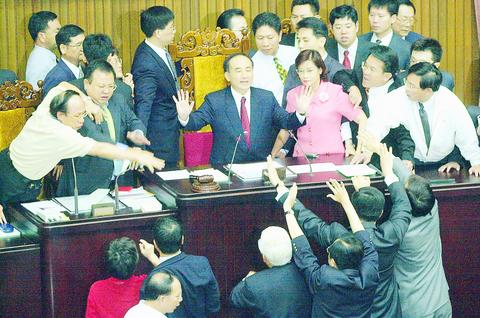Defying all forecasts, a senior presidential adviser won confirmation as Examination Yuan head while his proposed deputy failed to win approval by a wide margin.
Earlier in the day, the legislature also confirmed all 19 nominees for ranking posts in the body, the branch of government responsible for the civil service system.
The outcome, while cheering the DPP, creates a constitutional dilemma for President Chen Shui-bian (

PHOTO: CHIANG YING-YING, TAIPEI TIMES
Meanwhile, the confirmation frustrated the opposition alliance.
KMT Legislative Whip Lin Yi-shih (
Yao Chia-wen (姚嘉文), a former DPP chairman and lawmaker, secured just enough ballots for his nomination as Examination Yuan president after getting the minimum 113 votes needed for confirmation. One legislator voted against him and the other 111 abstained
"I'm glad I did not fail the appointment after all," a beaming Yao said. "As I have said, a few swing votes would decide my fate."
Yao, 64, owed his narrow victory to last-minute defections by a handful of KMT legislators. Earlier, the KMT and PFP had vowed to thwart his appointment, saying his past involvement in DPP and pro-independence activities made him unqualified for the job.
The Constitution stipulates that members of the Examination Yuan should be above partisanship and independently exercise their functions in accordance with law. Yao has said he would quit the DPP and refrain from pro-independence events if he won confirmation.
True to their threats, the opposition parties barred their lawmakers from attending the afternoon vote in an indirect show of disapproval.
As on Thursday, senior mem-bers from the KMT blocked all entrances to the legislative chamber and engaged in sporadic brawls with their DPP colleagues.
KMT Legislator Tseng-Tsai Mei-tso (曾蔡美佐) arrived in the legislature at 5:20pm and was immediately surrounded by fellow lawmakers who sought to prevent her from entering the voting venue.
The blockade drew vehement protests from DPP legislators, including Chou Ching-yu (
"You have no right to deprive her the right to vote," Chou said, struggling to help Tseng break through. "No party can engage in such conduct and call itself democratic."
Tseng later made her way to the chamber but shied away from the balloting boxes. Amid the commotion, four other KMT lawmakers -- Lu Shin-ming (呂新民), Lin Nan-sheng (林南生) Yang Wen-hsin (楊文欣) and Lin Chin-chun (林進春) -- defied the no-show order and cast their ballots.
They were believed to have provided the votes needed for Yao's triumph. The DPP and the TSU control only 102 votes in the 225-seat legislature, insufficient to pass the majority requirement despite the help of seven independent lawmakers.
KMT Aboriginal lawmakers, who attended Thursday's vote, did not show up yesterday afternoon. Caucus officials said they went hunting in the mountains together.
To the surprise of many, former interior minister Chang Po-ya (張博雅) obtained only 102 ballots, 11 short of the number needed to be confirmed as Examination Yuan vice president.
Chang, 60, now a national policy adviser, insisted that many opposition lawmakers backed her nomination but abstained from the vote at the behest of their caucuses.
"Had they participated, the result would be different," she said.

CHAOS: Iranians took to the streets playing celebratory music after reports of Khamenei’s death on Saturday, while mourners also gathered in Tehran yesterday Iranian Supreme Leader Ayatollah Ali Khamenei was killed in a major attack on Iran launched by Israel and the US, throwing the future of the Islamic republic into doubt and raising the risk of regional instability. Iranian state television and the state-run IRNA news agency announced the 86-year-old’s death early yesterday. US President Donald Trump said it gave Iranians their “greatest chance” to “take back” their country. The announcements came after a joint US and Israeli aerial bombardment that targeted Iranian military and governmental sites. Trump said the “heavy and pinpoint bombing” would continue through the week or as long

TRUST: The KMT said it respected the US’ timing and considerations, and hoped it would continue to honor its commitments to helping Taiwan bolster its defenses and deterrence US President Donald Trump is delaying a multibillion-dollar arms sale to Taiwan to ensure his visit to Beijing is successful, a New York Times report said. The weapons sales package has stalled in the US Department of State, the report said, citing US officials it did not identify. The White House has told agencies not to push forward ahead of Trump’s meeting with Chinese President Xi Jinping (習近平), it said. The two last month held a phone call to discuss trade and geopolitical flashpoints ahead of the summit. Xi raised the Taiwan issue and urged the US to handle arms sales to

State-run CPC Corp, Taiwan (CPC, 台灣中油) yesterday said that it had confirmed on Saturday night with its liquefied natural gas (LNG) and crude oil suppliers that shipments are proceeding as scheduled and that domestic supplies remain unaffected. The CPC yesterday announced the gasoline and diesel prices will rise by NT$0.2 and NT$0.4 per liter, respectively, starting Monday, citing Middle East tensions and blizzards in the eastern United States. CPC also iterated it has been reducing the proportion of crude oil imports from the Middle East and diversifying its supply sources in the past few years in response to geopolitical risks, expanding

Pro-democracy media tycoon Jimmy Lai’s (黎智英) fraud conviction and prison sentence were yesterday overturned by a Hong Kong court, in a surprise legal decision that comes soon after Lai was jailed for 20 years on a separate national security charge. Judges Jeremy Poon (潘兆初), Anthea Pang (彭寶琴) and Derek Pang (彭偉昌) said in the judgement that they allowed the appeal from Lai, and another defendant in the case, to proceed, as a lower court judge had “erred.” “The Court of Appeal gave them leave to appeal against their conviction, allowed their appeals, quashed the convictions and set aside the sentences,” the judges